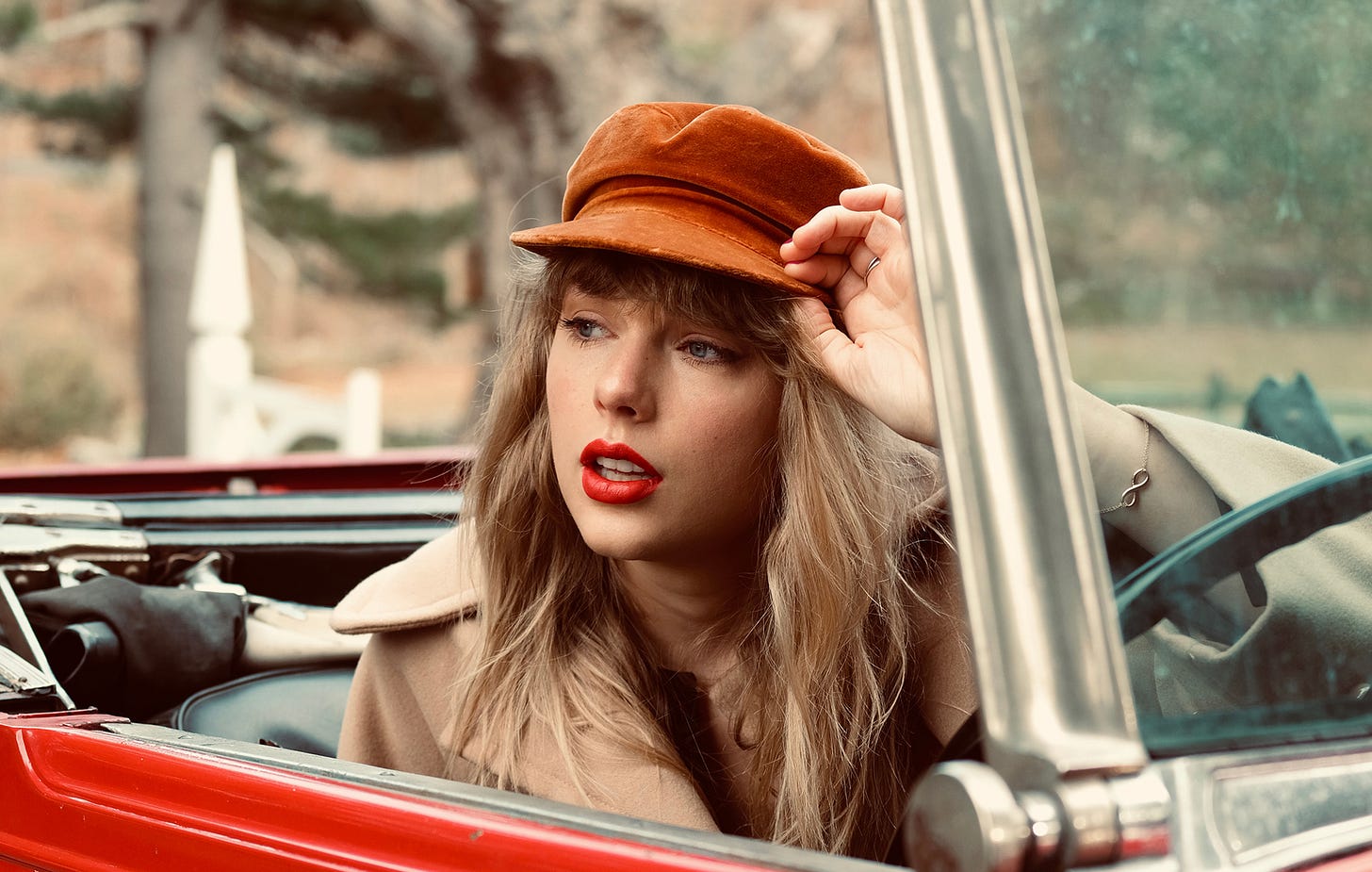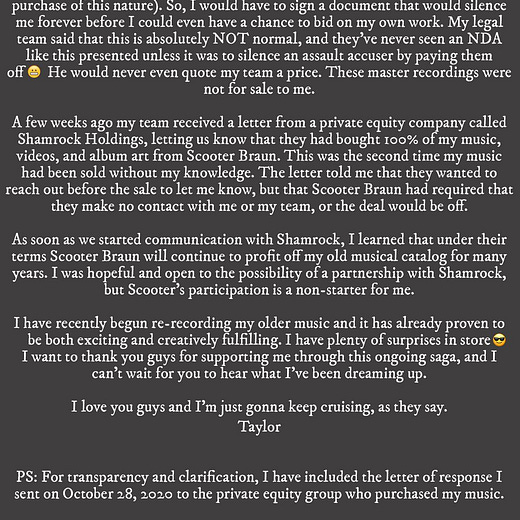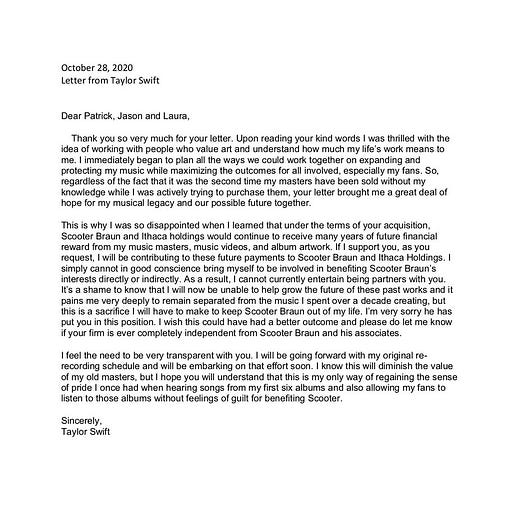Music Ownership (Taylor's Version)
Hi friends,
Regardless of whether you’re a Swiftie like I am or not, you probably heard that Taylor Swift recently released Red (Taylor’s Version), her second re-recorded album of 2021.
I’ll be covering her decision to re-record her fist six albums today, including:
Overview of Music Ownership
The Story in brief
How Recorded Music Makes Money
Impact on the original albums
The future of ownership
Music Ownership
First, let’s quickly touch on music ownership. The way music ownership typically works in the US is that there are two types of ownership:
Ownership of the “Masters”, which means owning all forms of the sound recording and which allows the owner to decide and benefit from revenue from licensing and physical / digital streams and sales
Ownership of the “publishing rights” which represents the aspects which helped create the recording such as the melodies, lyrics, etc.
Typically, the songwriter owns the publishing rights. These artists typically partner with record labels who help them get off the ground and with distribution and marketing. And generally, these record labels would negotiate to own the masters in perpetuity, though typically paying a portion of that as negotiated to the artist (along with an upfront cash payment).
The story in brief
When Taylor Swift was just getting started, she signed a recording deal with the record label Big Machine Records. Swift received a cash advance, and Big Machine owned the “masters” to all her albums released during the duration of the thirteen-year deal. Things started out well but the story of them looks like a tragedy now.
Swift then signed a new contract with Republic Records for her future albums, in which she negotiated owning the masters. However, Big Machine still owned the masters for her first 6 albums.
Swift had reportedly tried to buy ownership of the masters of the albums from Big Machine, but was offered unacceptable terms. Then, Scooter Braun, purchased Big Machine for $300M, meaning that he now owned the masters to Taylor Swift’s first six albums.
Taylor Swift and Scooter Braun aren’t exactly friends, and this acquisition angered Swift.
“This just happened to me without my approval, consultation or consent. After I was denied the chance to purchase my music outright, my entire catalog was sold to Scooter Braun’s Ithaca Holdings in a deal that I’m told was funded by the Soros family, 23 Capital and that Carlyle Group. Yet, to this day, none of these investors have bothered to contact me or my team directly — to perform their due diligence on their investment. On their investment in me. To ask how I might feel about the new owner of my art, the music I wrote, the videos I created, photos of me, my handwriting, my album designs.”
Disputes continued, until Taylor Swift came out in late 2019 saying she would re-record all six albums, so that she could own the masters to those new versions. Now, since Taylor owned the publishing rights for these works, doing so was perfectly legal, but Scooter and co thought she was bluffing. While most of the contracts say that you can’t re-record for a certain number of years, that duration ad already passed for at least her first five albums.
The following year, Scooter Braun sold just the Taylor Swift masters to investment firm Shamrock Holdings, for what is rumored to be in the $300M range, but also included earn-outs that likely push it higher.
At the time, Taylor revealed that she had been trying to acquire them, but Scooter Braun’s team had not cooperated and required things likes her agreeing she would never say a bad word about him to enter into negotiations. She found out Shamrock purchased it only after the transaction happened, because Braun’s team had required that Shamrock not contact Tayor Swift.
And so, Taylor Swift continued as planned with re-recording her work, now releasing both Fearless (Taylor’s Version) and Red (Taylor’s Version).
Before we get into the impact, let’s go into how the industry makes money.
Recorded Music Revenue Streams
The recorded music industry makes revenue in five main ways, with streaming now accounting for the vast majority of revenue (>60%). The owner of the masters of a piece of work is entitled to the revenue from the work from all of these streams:
Streaming (~63%): fees received when a song is streamed on streaming services (Spotify, Apple Music, Tidal, etc.)
Physical (~20%): Physical album sales
Other Digital (~5%): sales of individual songs or albums on digital channels (Apple Store)
Performance Rights (~10%): Royalties and fees from a song being used in public places (bars, outdoor performances, etc.)
Synchronization (~2%): Licensing fees from a piece of music being used in advertisements, tv shows, movies, etc.
As in the chart below, it was only in 2014 that the industry bottomed out and started its ascent as streaming started to grow and grow.
Now, while we don’t know what the breakdown of Taylor Swift’s first six albums revenue streams were, since they were older albums, and most physical and digital sales tend to be concentrated closer to the release, we can assume that Streaming made up a significant majority of revenue, with performance rights and sync also likely overrepresented.
Impact of the Re-recordings on the Original Masters
Taylor’s decision in general was well received by fans, with the hashtag #IStandWithTaylor trending on twitter after her post. But now that we know where revenue from the original masters may have been coming from in 2021 at the time of the re-recordings, let’s talk about the impact of the re-recordings on the value of the original masters.
Streaming: The new albums debuted very well and also rekindled interest in the songs in the album and naturally outperformed the non-Taylors-version of the song. In fact, Taylor Swift broke two Spotify records with her release of Red (Taylor’s Version), including the most streamed female album in a day with over 90M streams. One question is that once the new albums hype dies down, whether Spotify will prioritise the Taylor’s Version or the regular version of the song in things like search results. Most fans are obviously likely to want to play Taylor’s version, but perhaps some other listeners might not care. One thing to note is that the launch of these albums spurred interest in all of Taylor Swift’s back catalog, including some where no Taylor’s Version exists. Once all albums are recorded, I think the streaming revenue from the original masters will be 50-60% less, but in the interim, it may be less of a hit than that (or even a slightly increase).
Digital and Physical Sales: The re-recorded albums both debuted strongly on digital and physical sales, with All too Well debuting as the #1 song. Since the older masters probably don’t get much sales at this point anyway, this revenue stream for the original masters was likely not too big to begin with.
Performance Rights: While bars / radio shows can still choose between licensing the original masters or Taylor’s version (and in theory can bargain with both), the reality is that most of them will want to go with Taylor’s version, since they’re trying to appeal to Swifties, who wouldn’t respond too well if it came out later that they paid to license the version that Swift didn’t own. iHeartRadio for example have said they will only license Taylor’s Version of songs. One can imagine that the performance rights of the original masters will lose 70-80%+ of their licenses.
Sync: Taylor Swift had blocked syncs on her older masters to prevent this being a stream of revenue for Scooter Braun. Now as she is re-recording her albums, she has said she is very willing to allow movies, ads, to license her work as below. Although in theory since they could potentially negotiate with two parties, they may be able to negotiate slightly, the reality is most companies will want to work with Taylor to license her own version.
As one example highlighting the shift, when Taylor Swift saw Wildest Dreams going viral on TikTok and garnering over 700K streams on Spotify from that virality (the record for that song), she rushed to make a Taylor’s version of the song and the TikTok audio clip.
Fans immediately switched to using her version, with her new clip surpassing the original on TikTok, and doing over 3M streams on just the first day. Taylor’s Version of the clip was used in 70,000 videos on TikTok, compared to just 7,000 for the original, meaning Taylor’s version “captured” 90% of the value.
By re-recording her albums, Taylor is creating new value through the renewed interest in these songs (and the new songs contained in these albums). But she is also able to shift over 60%+ of the value of the masters of the original album to the new re-recorded albums which she owns the masters of.
The Future of Ownership
Saying that an artist should own their life’s work isn’t controversial. But it hasn’t been the reality for most artists, especially those starting out.
In rare cases, it ends up like the situation that Taylor ended up in, where not only does she not own her work, but it gets sold around without her knowledge to essentially her enemies. Can you imagine how it might feel to walk around in public hearing your song when you know that the person benefiting from that is an enemy? From your work!
But Taylor was able to take back some of the power by regaining her ownership. And her cautionary tale as well as her response to her struggles has made others take note, both the artists and labels.
Artists: Artists such as Olivia Rodrigo have said that they have negotiated to own their masters after observing the Taylor Swift battle. While Taylor Swift wasn’t the first artist to re-record her albums, others have taken note of it and partly inspired by it, have said they want to do the same. Some of them include: Joe Jonas and Ashanti
Labels: Labels are seeing what is happening and also trying to preserve the value they accrue. Some, like Universal, have been making new agreements with artists “effectively doubling the amount of time that the contracts restrict an artist from rerecording their work.”
While the internet has able to shift power towards artists, and reduced the importance of labels, the reality is that most artists starting out today still have to work with them, and so will have to cede to some of their terms, and may not own their music initially. But they’re gaining more power in the dynamic, and should be able to push for ownership earlier in their careers.
But maybe with web3, there are opportunities to better enable artists to own their work and avoid the use of gatekeepers that may prevent them from doing so. Some of these may include:
Artists selling social tokens in themselves or NFTs to raise the money they need initially to get started (in lieu of using a label which gives them a cash advance). This will also allow their true fans to benefit from their fandom and being early, but buying the tokens early, and seeing the value rise.
Artists tokenizing / fractionalizing their songs and allowing their fans and others to own a piece of their work and the revenue it generates, such as what Royal enables. Artists can in the future go back and purchase these tokens if they like at a market clearing price, rather than being face to face with a label that refuses to negotiate on reasonable terms.
Artists going direct (skipping record labels), leveraging both web2 platforms such as Spotify and web3 platforms such as Audius for distribution.
Thanks for reading! If you liked this post, give it a heart up above to help others find it or share it with your friends.
If you have any comments or thoughts, feel free to tweet at me.
If you’re not a subscriber, you can subscribe below. I write about things related to technology and business once a week on Mondays.







This has been explained so well. Loved the way it is structured.